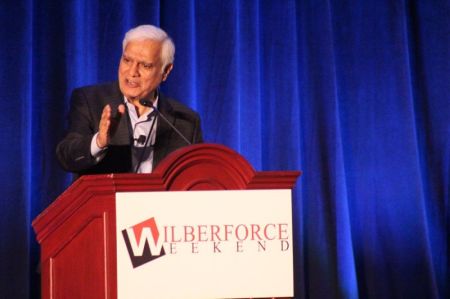Ravi Zacharias: Many mainstream churches lost the real Gospel, focus on feel-good moments

Christian apologist Ravi Zacharias said the reason many mainstream churches across the U.S. have experienced a decline in numbers is that they have “lost the real Gospel” and focused too much on “feel-good moments.”
“Some of the mainliners have lost numbers and they should’ve lost numbers because they lost the message," the 73-year-old author told Fox News. "If you’ve lost the real Gospel, people are going to say, ‘Why am I coming here? Is this an ethical society or a feel-good moment on Sunday morning?’
He added, "But the evangelicals have grown in numbers."
"Some of the churches that are biggest and most packed are those where the Gospel message of Jesus Christ is being given to the young and to those who are even thinking seriously about what life is all about."
The founder of Ravi Zacharias International Ministries also weighed in on the advancement of technology and its impact on the younger generations, noting that while “we have progressed immensely in our capacity to communicate,” we are also “living in front of a screen and missing out in relationships.”
“[S]o the questions are getting larger and larger and the soul is getting emptier and emptier,” he said, adding that when he began his ministry decades ago, apologetics heavily focused on debates regarding God’s existence. Now, he said, the questions “are more existential."
"All the questions you ask can only be answered after you have found the answer to the first question: Why you actually exist," he noted. "And when you find that relationship with God through Jesus Christ, as I believe, then all the other questions are justified and the answers are forthcoming."
Zacharias’ comments come on the heels of a recent survey that found that the youngest generation in America, Generation Z, ranks spirituality as their lowest value. The survey explains that a trend that sets this "digitally native" generation apart is the way they consume media.
Additionally, an April survey from Gallup found that an average of 50 percent of Americans in 2018 said they belong or are members of a church or other religious institution, representing a 20-percentage-point decline in church membership over the past 20 years.
In contrast, an earlier Gallup polling chart showed that weekly church attendance among Protestants has remained steady at around 45 to 46 percent in polling data compiled between 1983 and 2017.
In recent months, a number of leading pastors and church leaders have urged the wider church community to focus less on entertainment and more on biblical discipleship.
“The Church is coming under attack; it’s forgotten what the Church is supposed to be,” David Jeremiah, founder of Turning Point Radio and Television Ministries, told The Christian Post.
“We’re not an entertainment service; we’re not here to see how close we can get to what the world does. But there’s so much of the world in the Church and vice versa that we can’t tell a difference. We have to hold to the truth. We have to get nourished. If it’s not happening, you’re a social organization and not a church.”
Jeremiah cited research from Barna Group and the Cornerstone Knowledge Network which found that 67 percent of millennials prefer a “classic” church over a “trendy” one.
“Here in California, we see interest on the part of millennials and younger for the Bible and for truth,” the pastor said. “Most of the time, we see statistics about how people are leaving the Church, but in many respects, young people are demanding more truth, more teaching, and less entertainment. They’re not interested in shallow expressions of religion.”
The Case for Christ author Lee Strobel, who recently launched a center for evangelism and apologetics in collaboration with Colorado Christian University, also stressed the need for greater doctrinal teaching in churches today.
"We need in our churches a strong apologetics ministry so that we can help people understand it’s not just an emotional faith, but based on a solid foundation of historical truth and evidence," he told CP. "We need to teach people these truths so that they can pursue answers when doubts come in. When the euphoria of their conversion dissipates over time, they need to understand that there’s more to our faith."





















